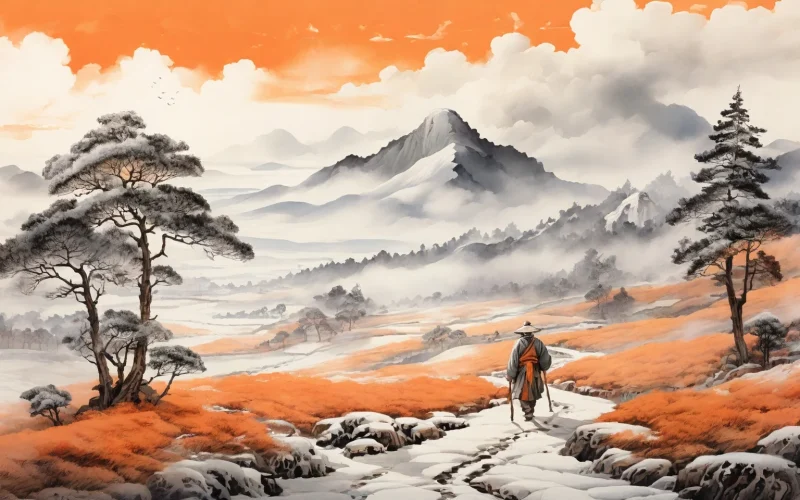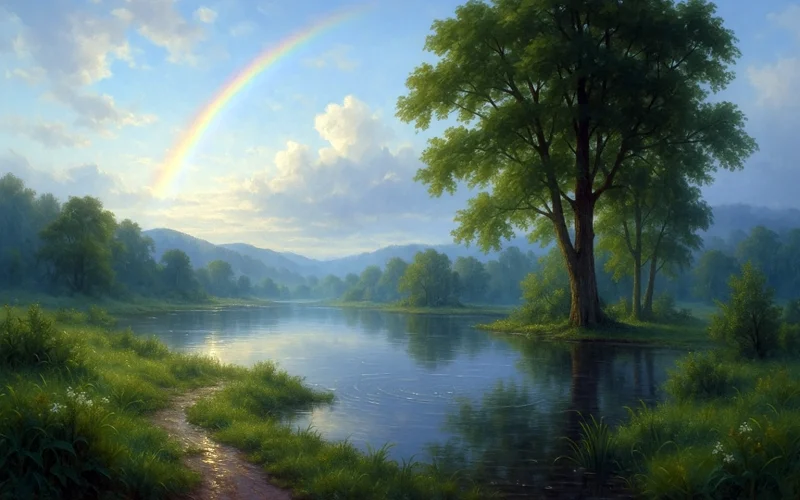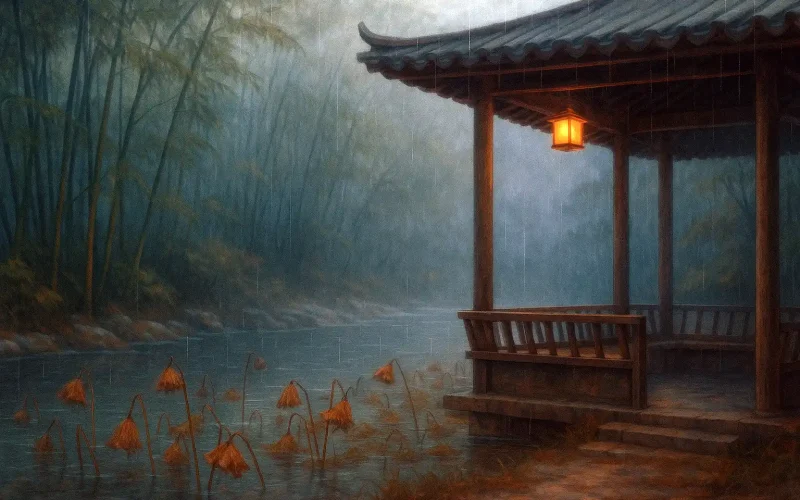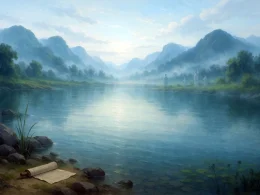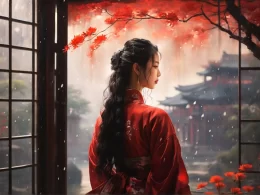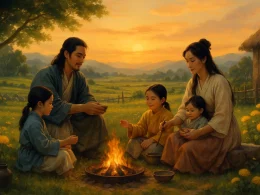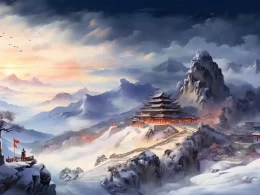When I questioned your pupil, under a pine-tree, " My teacher," he answered, " went for herbs, But toward which corner of the mountain, How can I tell, through all these clouds? "
Original Poem
「雪晴晚望」
贾岛
倚杖望晴雪,溪云几万重。
樵人归白屋,寒日下危峰。
野火烧冈草,断烟生石松。
却回山寺路,闻打暮天钟。
Interpretation
This poem, composed by Jia Dao of the Tang Dynasty, is set against the backdrop of a snow-covered mountain landscape, depicting a quiet and cold winter scene. Jia Dao, who spent his early years as a monk before returning to secular life, faced numerous setbacks in his political career and often lived in remote mountain temples. The sense of solitude in the poem reflects both the natural scenery and the poet's state of mind.
First Couplet: “倚杖望晴雪,溪云几万重。”
Yǐ zhàng wàng qíng xuě, xī yún jǐ wàn chóng.
Leaning on my staff, I gaze at the clear snow; the clouds above the stream stretch layer upon layer.
The poet stands in the mountains, leaning on his staff and looking into the distance. After the snow, the sky clears, and everything is covered in white, creating a serene and pristine atmosphere. The clouds above the stream, layered and dense, evoke a sense of vastness and depth, setting a tranquil and distant tone for the poem.
Second Couplet: “樵人归白屋,寒日下危峰。”
Qiáo rén guī bái wū, hán rì xià wēi fēng.
A woodcutter returns to his snow-covered hut; the cold sun slowly sets behind the steep peaks.
The verbs "return" and "set" inject life into the scene. The cold sun casts its light on the towering peaks, creating a sense of solitary grandeur. The woodcutter's footprints in the snow add a touch of human presence to the otherwise silent landscape, blending movement with stillness and enriching the imagery.
Third Couplet: “野火烧冈草,断烟生石松。”
Yě huǒ shāo gāng cǎo, duàn yān shēng shí sōng.
Wildfires burn the grass on the ridge; scattered smoke rises among the ancient pines on the rocks.
The poet shifts his gaze to the distance, where wildfires burn the dry grass, their red flames contrasting sharply with the white snow. The ancient pines stand tall among the rocks, with wisps of smoke curling around them, adding depth to the scene. The "scattered smoke" not only describes the changing scenery but also hints at the poet's wandering thoughts and shifting emotions.
Fourth Couplet: “却回山寺路,闻打暮天钟。”
Què huí shān sì lù, wén dǎ mù tiān zhōng.
Turning back on the path to the mountain temple, I hear the distant tolling of the evening bell.
After taking in the winter snowscape, the poet begins his return journey. The distant sound of the temple bell breaks the silence of the mountains, adding a touch of Zen-like tranquility. This closing line not only adds movement to the scene but also reveals the poet's inner solitude and his longing for a reclusive life.
Overall Appreciation
The poem delicately portrays the quiet and desolate scenery of a snow-covered mountain landscape. While the poem does not directly express emotions, the imagery of the cold mountains, lingering snow, the returning woodcutter, the setting sun, and the evening bell creates an expansive and lonely atmosphere. The poem combines the serenity of still scenes with the vitality of movement, showcasing the poet's keen observation and unique perception of nature. The concluding toll of the evening bell adds a lingering resonance, inviting reflection.
Writing Characteristics
- Blending Movement and Stillness, Clear Layers: Through dynamic descriptions like "leaning on my staff," "wildfires burn," "woodcutter returns," and "cold sun sets," the poet creates a vivid and varied scene, breaking the monotony of stillness and making the poem more lively.
- Vivid Contrasts, Deepening Imagery: The contrast between the cold after the snow and the burning wildfires, the silent mountains and the woodcutter's footprints, and the towering pines and the drifting smoke all enhance the poem's depth and resonance.
- Concluding with Resonance, Lingering Impact: The poem ends with "the distant tolling of the evening bell," adding layers to the imagery and creating a profound Zen-like atmosphere, leaving readers with much to ponder.
Insights
This poem captures the ethereal and profound beauty of nature while also reflecting the poet's contemplations on life's circumstances. The cold after the snow, the solitary sunset, and the distant evening bell all mirror the poet's detached and reclusive state of mind. It reminds us that beyond the noise of the world, there exists a tranquil space where one can return to inner peace and experience the quiet depth of life.
Poem translator
Xu Yuan-chong (许渊冲)
Jia Dao (贾岛), 779 - 843 AD, was a native of Daxing, Beijing. He was a monk in his early years, and later traveled to the eastern capital, where he was recognized by Han Yu and returned to secularism. Jia Dao's poems were mostly about the scenes of loneliness and sadness, and he was famous for his bitter poems at that time.





